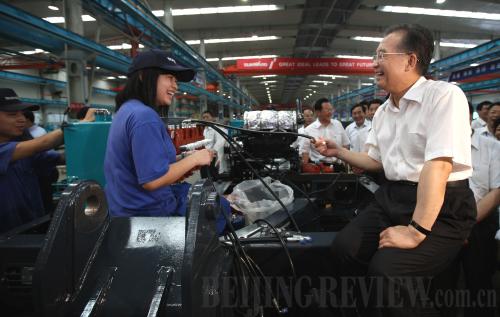|
 |
|
SURVEY: Chinese Premier Wen Jiabao talks with a worker at Hunan Sunward Intelligent Machinery Co. in Changsha, capital of central China's Hunan Province, on July 2, 2010. Wen made an inspection tour of the city to survey its economic situation (XINHUA) |
The speed of economic growth in China will slow down, according to Ha Jiming, chief economist at China International Capital Corp. Ltd. Both the world and Chinese economies will languish for quite some time, Ha said recently at a seminar at the School of Economics under Renmin University of China.
Although the Chinese economy registered a year-on-year increase of 11.9 percent in the first quarter, Ha said, it is showing uncertainty triggered by the sovereign debt crisis in Europe.
Ha said that there is no doubt that China's GDP growth will reach 9.5 percent in 2010, and the growth will decline gradually throughout the rest of the year, Ha said, estimating it will fall to merely 8 percent or less in the fourth quarter.
Ha said that factors impeding China's economic growth include declines in both investment and export orders, as well as falling sales of both houses and auto vehicles.
Growth of investment in fixed assets declined from 40 percent last year to 20 percent at present, with a dramatic decline in land trading.
China is also under inflation pressure, but this trend, according to Ha, will reverse due to the facts that the United States saw its CPI contract and the European countries are retrenching their fiscal expenditures and even cutting salaries and reducing social security benefits, which will lead to a sharp drop in domestic spending. The deflation risk in these countries will reduce China's inflation pressure.
Ha's opinion was echoed by Li Xunlei, chief economist with Guotai Junan Securities. "The global economy will not hit bottom a second time, but worldwide economic growth will slow down, as will economic growth in China," Li said in a recent interview with Chinese Business News.
The Chinese economy will develop in a W shape, with the second low point a little higher than the first, Li said. But the second upward slope will not rise as steeply as the first one, he added.
Li expects China's GDP in 2010 to increase 10 percent, but he doesn't think this figure has any real significance.
"Although GDP symbolizes the economic growth rate, it also indicates problems during growth," he said. Although China reached its goal of 8 percent GDP growth in 2009, the country's government debt and fiscal deficit both increased, accompanied by various problems in local fund-raising practices. "Economic growth should coincide with the improvement of people's living standard," Li said. "Otherwise, GDP growth makes no sense."
In terms of the real estate sector, Li said that in the short term, the government will continue to introduce new regulations and the sector will grow only minimally. But in the long run, the real estate industry will continue to grow until 2015 or later.
Ha agreed with Li's opinion that housing prices in China will continue to rise despite already being too high.
China's rapid urbanization in the future will support the development of the real estate industry, said Li. Adjustments in the real estate market should consider such important development factors as the shrinking of the labor force and the rise of the tertiary industry, as well as the matching of urbanization and GDP. "Otherwise, it will be hard to judge whether the real estate market is at its peak," said Li.
However, Wang Jian, executive secretary general of the China Society of Macroeconomics, told Xinhua that the Chinese economy will not slow dramatically. He predicted that overall growth in 2010 would be above 9 percent, with growth rates of 10.5 percent, 10 percent and below 9 percent, respectively, in the second, third and fourth quarters.
At a recent symposium held in Changsha, capital of central China's Hunan Province, Chinese Premier Wen Jiabao warned that China's macroeconomic control is facing increasing difficulties. Wen said the government would make efforts to promote stable and relatively fast domestic economic growth, address structural problems that have long existed, and manage inflation expectations.
"Wen's speech signaled that macroeconomic policy is tending to relax and that the Central Government will maintain 'stable growth,' which is an important premise for economic growth in the near future," said Wang.
(Sources: Caijing, Sohu and Xinhua.com) | 